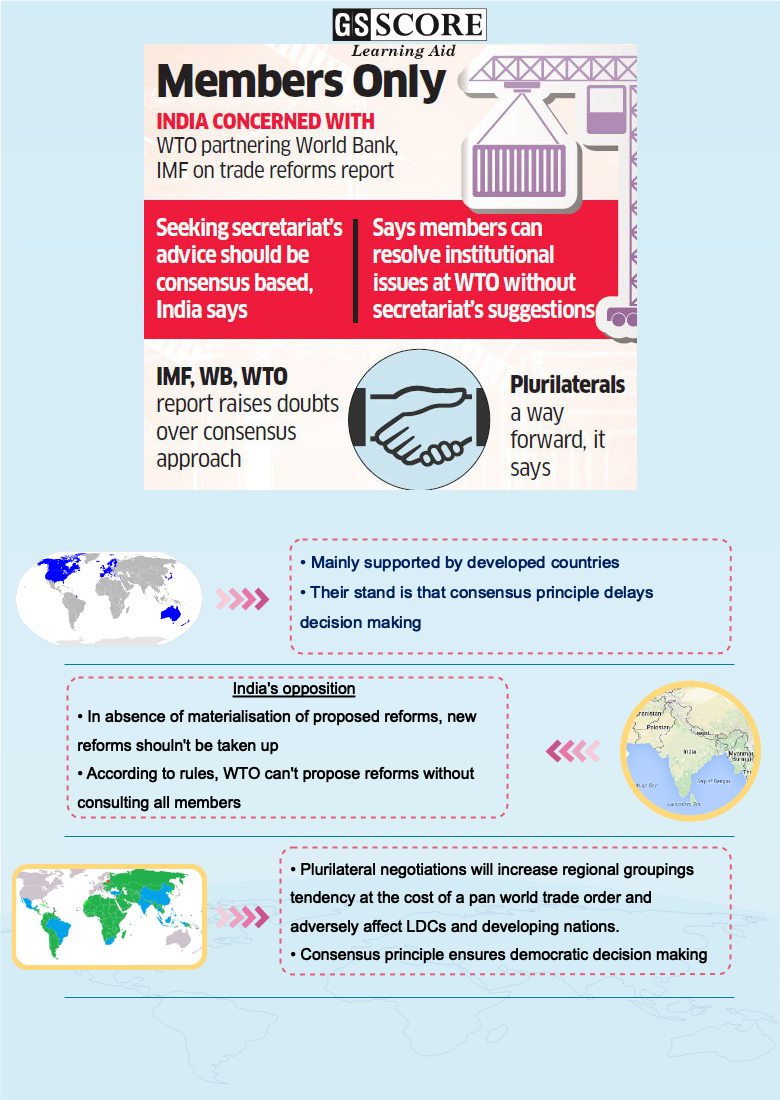

- Recently, WTO director general Roberto Azevedo, along with the chiefs of the World Bank and the IMF, issued a report, ‘Reinvigorating Trade and Inclusive Growth’ at the IMF meeting in Bali, Indonesia.
- The report mentions about proposed WTO reforms like discontinuing the consensus principle to arrive at a conclusion and replace it with plurilateral negotiations among member nations in new issues such as electronic commerce, investment facilitation, and disciplines for micro, and small and medium enterprises.
- In a more recently conducted informal Trade Negotiations Committee (TNC), India has opposed and criticized the reforms.
Issue
Context:
- Recently, WTO director general Roberto Azevedo, along with the chiefs of the World Bank and the IMF, issued a report, ‘Reinvigorating Trade and Inclusive Growth’ at the IMF meeting in Bali, Indonesia.
- The report mentions about proposed WTO reforms like discontinuing the consensus principle to arrive at a conclusion and replace it with plurilateral negotiations among member nations in new issues such as electronic commerce, investment facilitation, and disciplines for micro, and small and medium enterprises.
- In a more recently conducted informal Trade Negotiations Committee (TNC), India has opposed and criticized the reforms.
About:
- The World Trade Organization is an intergovernmental organization that regulates international trade. WTO aims at making global trade smooth, predictable and free.
- The WTO officially commenced on 1 January 1995 under the Marrakesh Agreement, signed by 124 nations ,replacing the General Agreement on Tariffs and Trade, which commenced in 1948.
- WTO currently functions as per the consensus principle under which multilateral trade negotiations are conducted called as the Single Undertaking framework.
- Under it, all major decisions are made by the membership as a whole, either by ministers (who meet at least once every two years) or by their ambassadors or delegates (who meet regularly in Geneva).
- On the other hand, plurilateral agreements are deals negotiated among a group of like-minded members that are limited to certain sectors of goods or services.
- WTO is a global body, mandated to make world trade fair and free. Plurilateral negotiations can potentially encourage regional groupings, allaying the scope of global trade. It can also harm smaller and least developed countries, giving undue advantage to developed nations and powerful trade blocs.
Background:
- The proposal for replacing multilateral negotiations with plurilateral ones have been supported by major industrialized countries, such as the United States, the European Union, Japan, Canada, and Australia. According to them, the consensus principle often leads to delaying in decision making and deadlock over contentious issues.
- India and WTO have locked horns in the past owing to various international trade issues like agricultural subsidies, solar panel content, etc
- India along with other developing nations has demanded institutional, operational and structural reforms in WTO.
- Various trade disputes have also occurred between India and other players like US and the European Union in the past due to various issues.
Timeline of WTO reforms in the past:
- 1986-1994 - GATT negotiations culminate in the Marrakech Agreement that establishes the World Trade Organization(WTO).
- November 2001 - The Fourth Ministerial Conferencetakes place in Doha, Qatar. WTO members agree on the Doha Development Agenda (DDA or just Doha Round), the ninth trade round which is intended to open negotiations on opening markets to agricultural, manufactured goods, and services. The Conference issues the Doha Declaration.
- August 2004 - Geneva talks achieve a framework agreement on the Doha round. Developed countries will lower agricultural subsidies, and in exchange the developing countries will lower tariff barriers to manufactured goods.
- The Bali package of 2013 includes provisions for lowering import tariffs and agricultural subsidies, with the intention of making it easier for developing countries to trade with the developed world in global markets.
- 2017-The Nairobi Ministerial Conference ended with a number of ministerial decisions, including on fisheries subsidies and e-commerce duties, and a commitment to continue negotiations in all areas.
- National Committee on Trade Facilitation (NCTF) under the Chairmanship of Cabinet Secretary has been constituted after the ratification of the Trade Facilitation Agreement (TFA) of World Trade Organization (WTO) by India in April, 2016.
Analysis
Indian disputes at WTO
- India has had problems with US, Canada, EU and China in the field of global trade.
- India recently lost against US in the Dispute resolution body in the case of ‘domestic content requirement for solar panels.
- India along with other developing and least developed countries, namely the G-33 had opposed the Agreement on agriculture (AoA) made in Uruguay round due to its favouring lean towards developed nations. As a result, peace accord has been agreed upon in 2013 for food stocking program without violating the AoA.
- US pharma industries made reservations against compulsory licensing practice in India which India along with developing nations modified in Doha development round, allowing it.
- EU in a concept paper ‘WTO modernization’ criticized WTO for allowing world’s largest and dynamic countries like India, China, Brazil, etc for claiming special and differential treatment.
India’s stance on latest proposed WTO reforms:
- Criticism against the plurilateral negotiations were based mainly on the premise that such reforms stand unfair when already needed reforms are not yet materialized and disputes still exist.
- WTO’s recent consultation with IMF and the World Bank violated the core principles of the Marrakesh Agreement for conducting the business at the trade body. According to rules of Marrakesh Agreement, the secretariat cannot offer or propose reforms without prior approval of all the 164 members.
- Plurilateral negotiations reform is pushed for new issues such as electronic commerce, investment facilitation, and disciplines for micro, and small and medium enterprises. Digital divide and numerous other concerns in countries like India will affect the WTO’s proposals.
- The consensus principle at WTO reassures that democratic decision making takes place and all member nations are involved in the process. The recent proposal might harm this deliberating and participatory procedure.
Future of future international trade:
- Trade wars: Trade giants like America and China have waged trade wars against each other whereby US has imposed tariffs on Chinese steel and aluminum to protect domestic players. More such trade are like to be seen between various trading nations and blocs in future.
- Protectionism: Trading nations particularly US, China, India, etc have been accused of promoting protectionism under the pretence of domestic growth and nationalism is highly detrimental to global trade. IMF in its recent Global Financial Stability Report have alerted about threats of protectionism in world trade order.
- Volatility: Low demand, lower wages, higher oil prices along with risky offshore investments involving hot money has made global trade volatile, uncertain and fragile.
- Groupings: Trade blocs like the North American Free Trade Agreement (NAFTA), the Association of Southeast Asian Nations (ASEAN) and Asia-Pacific Economic Corporation (APEC) are gaining more significance than a pan-world trading order.
Way forward:
- If plurilateral negotiations are imposed, it should become mandatory to spell out clear criteria for when a country may use its veto power, thus justifying the cause.
- Stalling of Bali package also needs to be soon resolved. An independent panel could play the role of arbiter, evaluating the competing claims and helping to overcome the political posturing on both sides.
- India, as the unsaid leader of developing and LDC’s should strengthen its diplomatic competence and ensure that everyone’s voices are heard at the platform.
- A right balance should be weighed between relaxations to boost growth and development in developing and under-developed nations and the demand of fair trade by developed nations.
- Bilateral and multilateral talks outside WTO dispute settlement mechanism should be promoted to ensure healthy relationships and quick and deliberated conclusions.
As the WTO’s members discuss reform proposals, they need to ensure not only that the WTO becomes more efficient, but also that it is inclusive and delivers on development, raising global trade volumes and aiding economic development uniformly all over. Thus, the onus of world economic development is on trading partners as well as the WTO equally.
Learning Aid

Practice Question:
India’s concerns in Doha Round Ministerial Conferences need to be examined weighing both its pros and cons. Examine in contaxt of a permanent Peace clause.



